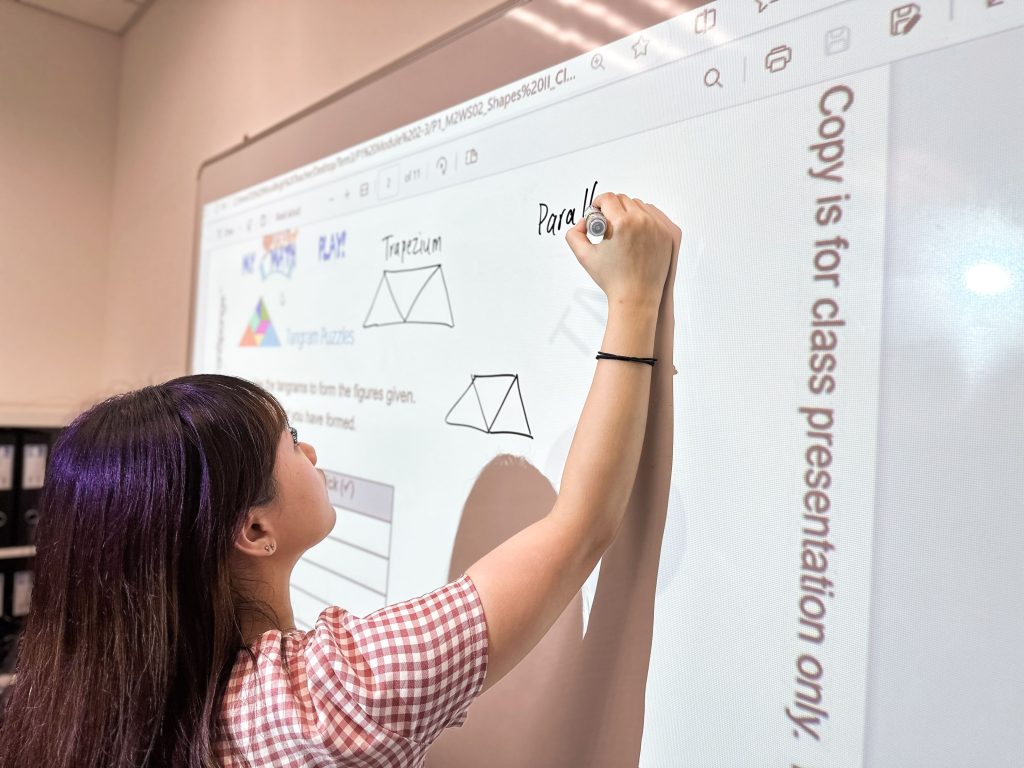
Has your child been coping well with Primary 5 Mathematics, only to face difficulties with the same subject in Primary 6?
This is not an isolated problem, but a common issue faced by many children across the Singapore
The leap from Primary 5 to Primary 6 in Mathematics is a significant one, largely due to the increased complexity of topics and the intensive preparation needed for the Primary School Leaving Examination (PSLE) in Singapore.
Many children who performed competently in Primary 5 may find themselves struggling as the demands of their final year of primary school set in.
This article will explain some of the main reasons behind this challenge and suggest practical strategies to help your child succeed in Primary 6 Math. With the right support, your child can adapt to the rigours of Primary 6 and approach the PSLE with confidence.
Why is Your Child Struggling With Mathematics in Primary 6?
Here are some reasons why your child may find it challenging to cope with the Primary 6 Mathematics syllabus as they move up from Primary 5.
1. Greater Complexity in Mathematics Topics
Primary 6 Mathematics builds upon the previous years’ syllabus but introduces even more advanced topics and higher-level applications, such as:
- Algebra: A new concept for most students, requiring a strong grasp of abstract reasoning and the ability to manipulate equations that do not contain numbers.
- Advanced Problem Solving: Students are tested on several concepts at once, through questions that may combine topics like fractions, percentages, and ratios in a single problem.
- Challenging Geometry: Topics like angles and the properties of circles are more complex and require precise visualisation, the application of multiple formulae, and a certain degree of spatial awareness.
- Rate, and Volume Problems: These demand strong analytical skills and accurate calculations, supported by the ability to interpret word problems correctly and identify relevant data.
The cumulative nature of these Mathematics topics means that students who have displayed prior weaknesses in foundational skills from Primary 5 or earlier can find it difficult to keep up.
2. Greater Focus on PSLE-Style Questions
In Primary 5 and 6, the emphasis shifts to PSLE-style problem-solving, which involves multi-step, non-routine questions. These questions are designed to test a student’s ability to apply their knowledge in complex, unfamiliar situations, often requiring them to:
- Apply multiple heuristics simultaneously to reach a solution. For example, techniques like model drawing may need to be combined with problem-solving strategies such as working backward and quantity x value, to solve a problem.
- Interpret “tricky-worded” or lengthy questions with accuracy. These questions test students’ comprehension as well as their math skills.
- Solve the problem within strict time constraints to produce effective and accurate work.
If a child isn’t accustomed to solving these types of questions, they may find the transition overwhelming and discouraging.
3. Increased Stress and Pressure to Perform
As the PSLE approaches, the emotional and psychological pressure on Primary 6 students escalates significantly. Many children begin to feel the weight of expectations from school, parents, and even themselves.
As a result, children can experience hesitation and anxiety, which may cause them to second-guess themselves, even on questions they know how to solve.
Additionally, the combination of schoolwork, assessments, and revision can leave Primary 6 students mentally and physically drained, reducing their ability to focus and retain information. Children’s confidence may also suffer, especially if they compare themselves to classmates who seem to excel in areas where they struggle.
4. Gaps in Understanding from Primary 5
Mathematics is a cumulative subject, which means that concepts will build upon each other and expand as children progress through school. Any unresolved learning gaps from earlier years will become more problematic in Primary 6.
For example:
- A child who experienced difficulties handling fractions in Primary 5 will find it harder to solve algebraic or ratio and percentage-based problems in Primary 6.
- A child who still faces issues applying problem-solving strategies from their earlier Primary school years may struggle when faced with multi-step PSLE Math questions.
5. Increased Need for Independence
By Primary 6, children are expected to take greater responsibility for their learning.
Teachers will focus more on preparing the class for PSLE through practice papers and reviews. This leaves less time to revisit basic concepts from previous years or address individual students’ learning gaps.
In this environment, children may be expected to manage their own revision schedule and keep up with the Primary 6 syllabus, demands that not all students will be equipped to handle effectively. This change in the support and supervision given to children can lead to some children feeling lost and overwhelmed.
6. Time Pressure in Exams
PSLE exam papers are designed to test not only a student’s understanding of a subject, but also their ability to work under the pressure of time constraints.
Some students may struggle to complete all the Math questions in the allotted time, leading to errors and incomplete work which compromises their scores. Children could also find it challenging to balance the time they spend on solving easy questions versus harder ones.
For instance, some children may spend too much time trying to solve a challenging Math problem, only to run out of time before reaching easier questions they could have answered correctly.
How Parents Can Help a Primary 6 Child Overcome Math Struggles
Armed with the right strategies and a positive approach, you can help ease your child’s transition from Primary 5 to Primary 6 Math and better prepare them for the PSLE.
- Identify and Address Learning Gaps Early
Work with your child to pinpoint areas they find challenging, including Math concepts from Primary 5 or earlier. Whether it’s algebra, fractions, or problem-solving strategies, revisiting these topics and filling the gaps will make new concepts easier to grasp.
Tip: Use Primary 5 revision materials or enlist the help of an experienced learning centre like Oodles Learning for targeted support.
- Practice PSLE-Style Questions Regularly
Expose your child to PSLE-style questions early in the year. This allows them to become familiar with the format, level of difficulty, and expectations of the exam. With gradual and consistent practice, they can build confidence over time and feel less anxious as the PSLE approaches.
Tip: Start with easier problem-solving questions and gradually increase the difficulty level to challenge your child without overwhelming them.
- Break Down Multi-Step Problems
Multi-step problems are an essential part of Primary 6 Math. If your child struggles with this, teach them how to approach multi-step questions methodically.
Encourage them to:
- Read the question carefully to understand what they are being asked to solve.
- Identify key pieces of information within the question and connect them in a meaningful way.
- Break down the question into parts and solve them one at a time to avoid feeling overwhelmed or getting confused.
- Focus on Time Management Skills
Time management is vital as children prepare for the PSLEs. Help your child develop a sense of pacing by timing their Math practice sessions. The more familiar they become with working under time constraints, the less intimidating timed exams will feel.
In addition, teach your child to approach exam questions strategically. Encourage them to first identify and complete the questions they feel confident about, then return to the more challenging ones. This approach can help build momentum, reduce stress, and make better use of limited time during tests.
- Support Their Emotional Well-Being
Remind your child that it’s okay to make mistakes and that errors are a normal part of the learning process. Rather than focusing only on high test scores or perfect grades, celebrate their effort, persistence, and progress. Encouraging a growth mindset helps build resilience and confidence throughout the year.
Tip: Balance study time with breaks and relaxation to prevent burnout. Encourage your child to keep practising their hobbies and interests alongside schoolwork and revision.
- Consider Expert Guidance
If your child is struggling despite your best efforts, enrolling them in a trusted math enrichment programme can make a big difference.
Programmes like those at Oodles Learning are designed to:
- Provide personalised attention to address your child’s unique challenges.
- Equip them with proven problem-solving strategies.
- Develop their exam-readiness through assessments conducted in simulated exam conditions
- Build their confidence and help them develop a systematic approach to tackling PSLE questions.
Why Oodles Learning Can Help Your Child Succeed

At Oodles Learning, we understand the unique challenges Primary 6 students face as they prepare for the PSLE.
That’s why our Math programmes are built around an MOE-aligned syllabus, delivered by experienced coaches using proven strategies to ensure that each child gets the support they need to grow in confidence and mastery.
Our experienced coaches provide:
- PSLE-focused lessons to help students master key topics and question types.
- Personalised support based on each child’s strengths and areas for improvement.
- Practical strategies for tackling non-routine and multi-step questions with confidence.
With Oodles Learning, your child will not only strengthen their Primary 6 math skills but also develop the mindset needed to approach the PSLEs with positivity and resilience.
Give Your Child the Tools to Thrive in Primary 6 Math
The transition to Primary 6 Mathematics may be challenging, but with the right support, your child can overcome these hurdles and excel in the PSLE.
By addressing learning gaps, fostering a positive mindset, and providing consistent practice, you can help them build the skills and confidence needed for success in their final year of primary school Mathematics.
Partner with Oodles Learning today to give your child the expert guidance they need to thrive in PSLE Mathematics.
Book a free trial class at your nearest Oodles Learning centre and let’s make Primary 6 a year of growth and achievement!
For more tips, resources, and updates, follow Oodles Learning on Instagram, Facebook or contact us directly through our website.







